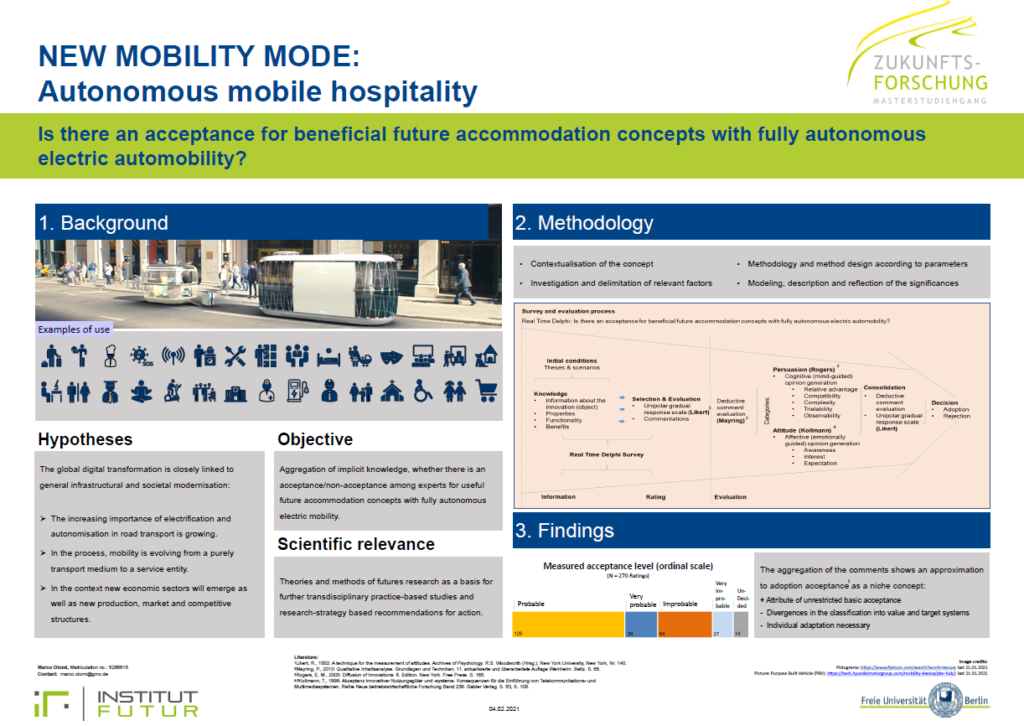
goodnit ©
Future Studies & Strategic Foresight for autonomous electromobile accommodation
Future Studies & stategic foresight: aggregates and analyzes trends with professional methods to compose possible futures. It includes analyzing the sources, patterns, and causes of change and stability in an attempt to develop foresight.
As a futurist, I am researching future-proof benefit-generating accommodation concepts using the example of fully automatic electric automobility as a new innovative hybrid accommodation typology. The basis for this are electric-powered and autonomously driving platforms which – with the appropriate equipment – should represent a new or novel mobile type of accommodation. The aim is to generate new business areas and employment models in the context of global electrification and the digitalization of mobility, to establish disruptive innovations of new forms of accommodation and to offer market participants ecological and economic alternatives to classic accommodation.
The concrete mission of Goodnit © is to use theories and methods of futurology to develop and provide a starting point for further transdisciplinary action-practical studies and strategic recommendations for action. The focus is on the disruptive change in accommodation and the associated innovation of new accommodation formats such as stay and work options with autonomous electric mobility as new service formats (keyword MaaS: Mobility as a Service).
THE PERFORMANCE-DEFINING MOBILITY
The approach of Goodnit © is closely linked to the general infrastructural and social development in the context of the global digital transformation taking place.
The far-reaching significance of the autonomization of road traffic is undisputed in view of the rapidly growing cities and agglomerations, for safety-related traffic aspects and due to increasing internationalization as well as improved individual mobility. In the process, mobility is evolving from a pure transportation medium to a service instance. In short, customers no longer follow the product, but the product follows or adapts to the needs of the customers. As a result, the focus is increasingly shifting to mobility that determines performance.
IS A NEW HOSPITALITY TYPOLOGY EMERGING?
In the course of digitalization, electrification and autonomization of mobility, new economic sectors and new production, market and competitive structures are developing. These make it necessary to also disruptively rethink accommodation services for users and operators and to develop a performance-driven mobile and innovative value creation. This multiplication of options includes hybrid forms of stay such as classic accommodation and stay services as well as work, logistics and storage platforms as a potential new accommodation typology.
EXAMPLE: THE HOSPITALITY MARKET
The hotel and accommodation market is not only an important economic factor within the European Union, but is also of great economic significance with regard to global markets. For example, the European lodging industry has 40 percent of the world’s hotel capacity. In addition, Europe ranks sixth globally among the ten most popular vacation regions and attracts nearly 60 percent of international tourist flows each year. In Germany alone, around 31 billion² euros in net revenues were generated from around 775 million overnight stays³ in 2018. Upward trend.
For the classic hotel, camping and caravaning industry, the use of the Autonomous mobile Hostel © concept can mean a diversification or a business field development up to a partial substitution. Autonomously driving units offer mobile overnight accommodations or also stay solutions depending upon need. The guest does not come to the vehicle, but the vehicle comes to the guest. The autonomously driving car and its aforementioned traffic characteristics thus become the mobile host, which becomes the guest’s mobile companion along its use. Using intelligent applications and shared networks, on-demand autonomous mobile accommodation solutions such as an Autonomous Mobile Hostel © can be accessed, for example, in urban areas, on highways, or as a mobile hotel at event venues.
THE „ACCOMMODATION“
However, autonomous electromobile accommodations is not limited to lodging for staying or staying overnight. Rather, the „accommodation“ stands for numerous synonyms with their groups of meanings
These meaning groups provide information about the numerous possible applications (cf. poster below) and thus also about the high relevance from a social and economic perspective. This also explains the approach of seeing classic accommodation in the sense of an establishment that regularly or occasionally offers overnight accommodations for travelers as only one part of autonomous electromobile Accommodation.
REAL TIME DELPHI
‚NEW MOBILITY MODE:
Autonomous mobile Hospitality‘
„Is there acceptance for beneficial future accommodation concepts with fully autonomous electric automobility?
The Real Time Delphi, an online-based expert survey conducted as part of the Master’s degree program in Futurology at the Free University of Berlin, focused on the potential new type of accommodation and the question of its acceptance. The goal was to be able to derive with the work the answer to the question whether there is an acceptance / non-acceptance among experts for future benefit-generating accommodation concepts with fully autonomous electric mobility. From 156 comments and 270 evaluations of experts could be drawn thus a first conclusion for this not yet existing innovation and so far not yet investigated abstraction of the autonomous electromobile accommodation.
The following summary poster provides a first insight into the study.
If you would like to read more about it or knowledge, you find here soon the link to the master Thesis or send a mail to: marco@goodnit.de.

Sources:
1(Gross: „die Multioptionsgesellschaft“, 1994, im St. Galler Tagblatt (Hrsg.) vom 01.05.2001)
²(Vgl.: Dehoga Zahlenspiegel IV/2018)
³(vgl.: Dehoga Zahlenspiegel IV/2018. Hotel und Beherbergung zusammen)
4(Dornseiff Bedeutungsgruppen. Wortschatz Corpora, Universität Leipzig)
5(vgl. Europäische Kommission 1998, Richtlinie 95/57/EG)
6(vgl. Kollmann, T., 1998, S. 96)